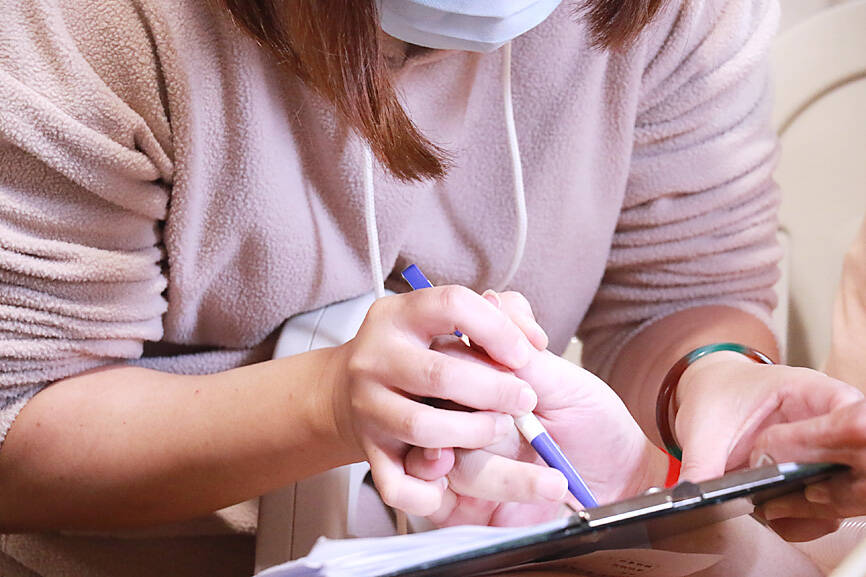The first brain donated by a patient who died from amyotrophic lateral sclerosis (ALS) was delivered to the Taiwan Brain Bank recently, Taichung Tzu Chi Hospital said on Tuesday.
The donor, Huang Ting-cheng (黃鼎承), was a 50-year-old man diagnosed three years ago with the fatal motor neuron disease, which progressively paralyzes people.
Huang decided to donate his brain when he heard the brain bank was seeking brain tissue from people with motor neuron diseases for medical research and drug development.

Photo courtesy of Taichung Tzu Chi Hospital via CNA
After being notified of Huang’s decision, Hsieh Sung-tsang (謝松蒼), Taiwan Brain Bank Association chair and neurology physician at National Taiwan University Hospital (NTUH), traveled from Taipei to the Taichung hospital where Huang was receiving hospice care.
At the time, Huang was already paralyzed below the neck and signed the organ donation consent form with his wife guiding his hand.
Huang passed away on Wednesday last week after being taken off life support. His body was transferred to NTUH, the only hospital in Taiwan capable of brain donation operations.
Also on Tuesday, Hsieh told reporters via a phone interview that he was very grateful for Huang’s generosity.
Huang is the first ASL brain donor in Taiwan, making it particularly meaningful for the brain bank, Hsieh added.
Other studies have indicated that neurodegenerative diseases could affect other organs, Hsieh said.
Therefore, in addition to his brain, Huang donated his heart, liver, lungs, intestines and stomach, as well as his blood for next-generation sequencing.
Since its establishment in November last year, the brain bank has received more than a dozen signed brain donation consent forms, including some from healthy people.

Chinese Nationalist Party (KMT) Chairman Eric Chu (朱立倫), spokeswoman Yang Chih-yu (楊智伃) and Legislator Hsieh Lung-chieh (謝龍介) would be summoned by police for questioning for leading an illegal assembly on Thursday evening last week, Minister of the Interior Liu Shyh-fang (劉世芳) said today. The three KMT officials led an assembly outside the Taipei City Prosecutors’ Office, a restricted area where public assembly is not allowed, protesting the questioning of several KMT staff and searches of KMT headquarters and offices in a recall petition forgery case. Chu, Yang and Hsieh are all suspected of contravening the Assembly and Parade Act (集會遊行法) by holding

PRAISE: Japanese visitor Takashi Kubota said the Taiwanese temple architecture images showcased in the AI Art Gallery were the most impressive displays he saw Taiwan does not have an official pavilion at the World Expo in Osaka, Japan, because of its diplomatic predicament, but the government-backed Tech World pavilion is drawing interest with its unique recreations of works by Taiwanese artists. The pavilion features an artificial intelligence (AI)-based art gallery showcasing works of famous Taiwanese artists from the Japanese colonial period using innovative technologies. Among its main simulated displays are Eastern gouache paintings by Chen Chin (陳進), Lin Yu-shan (林玉山) and Kuo Hsueh-hu (郭雪湖), who were the three young Taiwanese painters selected for the East Asian Painting exhibition in 1927. Gouache is a water-based

Taiwan would welcome the return of Honduras as a diplomatic ally if its next president decides to make such a move, Minister of Foreign Affairs Lin Chia-lung (林佳龍) said yesterday. “Of course, we would welcome Honduras if they want to restore diplomatic ties with Taiwan after their elections,” Lin said at a meeting of the legislature’s Foreign Affairs and National Defense Committee, when asked to comment on statements made by two of the three Honduran presidential candidates during the presidential campaign in the Central American country. Taiwan is paying close attention to the region as a whole in the wake of a

OFF-TARGET: More than 30,000 participants were expected to take part in the Games next month, but only 6,550 foreign and 19,400 Taiwanese athletes have registered Taipei city councilors yesterday blasted the organizers of next month’s World Masters Games over sudden timetable and venue changes, which they said have caused thousands of participants to back out of the international sporting event, among other organizational issues. They also cited visa delays and political interference by China as reasons many foreign athletes are requesting refunds for the event, to be held from May 17 to 30. Jointly organized by the Taipei and New Taipei City governments, the games have been rocked by numerous controversies since preparations began in 2020. Taipei City Councilor Lin Yen-feng (林延鳳) said yesterday that new measures by